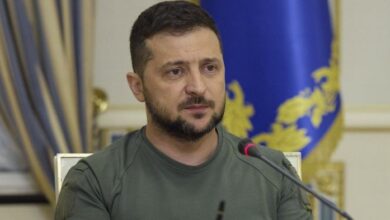
Rand Paul Blocks Ukraine Aid: A Senate Showdown
Rand paul stalls senate passage of 40 billion in ukraine aid – Rand Paul’s decision to stall the Senate’s passage of a $40 billion aid package for Ukraine has sparked a heated debate, pitting those who believe in unwavering support for Ukraine against those who question the cost and effectiveness of such aid.
This move has injected a new layer of complexity into an already tense geopolitical situation, raising questions about the future of US-Ukraine relations and the role of Congress in shaping foreign policy.
The $40 billion package, designed to provide military, humanitarian, and economic assistance to Ukraine, has garnered bipartisan support, with many arguing that it is crucial to bolster Ukraine’s defense against Russia’s ongoing invasion. However, Senator Paul, a vocal critic of the package, has raised concerns about the potential for waste, corruption, and the effectiveness of such aid.
His actions have prompted a flurry of arguments from both sides, with each side seeking to justify their position and sway public opinion.
Background of the Ukraine Aid Package
The $40 billion Ukraine aid package, formally titled the “Ukraine Supplemental Appropriations Act, 2022,” is a significant financial commitment by the United States to support Ukraine in its defense against the Russian invasion. This package represents a substantial increase in U.S.
assistance to Ukraine, reflecting the escalating conflict and the need for continued support.The aid package is designed to provide multifaceted support to Ukraine, encompassing military, humanitarian, and economic assistance. This comprehensive approach aims to bolster Ukraine’s ability to defend itself against Russian aggression, alleviate the humanitarian crisis, and support the Ukrainian economy during the war.
Military Assistance
The package allocates a significant portion of funds to bolster Ukraine’s military capabilities. This includes providing advanced weaponry, ammunition, and other essential military equipment. The United States has already supplied a wide range of military equipment to Ukraine, including Javelin anti-tank missiles, Stinger anti-aircraft missiles, and howitzers.
This aid package is expected to further enhance Ukraine’s defensive capabilities and help them counter Russian advances.
Humanitarian Assistance
Recognizing the severe humanitarian crisis unfolding in Ukraine, the aid package includes substantial funding for humanitarian relief efforts. This funding is directed towards providing food, water, shelter, medical supplies, and other essential humanitarian assistance to Ukrainian civilians displaced by the war.
International organizations and NGOs are playing a critical role in delivering these essential services to those in need.
Economic Assistance, Rand paul stalls senate passage of 40 billion in ukraine aid
The aid package also includes a significant component of economic assistance aimed at supporting the Ukrainian economy, which has been severely impacted by the war. This economic aid is intended to help Ukraine maintain essential government functions, provide financial support to citizens, and rebuild its infrastructure once the conflict subsides.
Political Context
The Ukraine aid package has garnered bipartisan support in the U.S. Congress, reflecting the widespread recognition of the importance of supporting Ukraine in its fight against Russian aggression. However, there have been some dissenting voices, primarily from within the Republican Party, who have raised concerns about the cost of the aid package and its potential impact on the U.S.
It’s been a wild week in the news, with Rand Paul’s hold on the Senate vote for Ukraine aid making headlines. While that’s a serious issue, I can’t help but be reminded of the recent select Jif products recalled for potential salmonella – talk about a peanut butter punch in the gut! The Jif recall is a stark reminder that sometimes the most unexpected things can throw a wrench into our daily routines, just like Rand Paul’s move has disrupted the flow of aid to Ukraine.
economy. Despite these concerns, the package has received strong support from both Democrats and Republicans, demonstrating a broad consensus on the need to stand with Ukraine.
While Rand Paul stalls the Senate passage of $40 billion in aid for Ukraine, it’s interesting to see what’s happening on the other side of the world. Farmers in England are experimenting with a new method of carbon capture by burying burnt wood in their fields to absorb CO2.
It’s a fascinating approach to environmental sustainability, and it’s worth noting that while political battles rage over Ukraine, the global climate crisis continues to demand attention and action.
Rand Paul’s Stalling Tactics: Rand Paul Stalls Senate Passage Of 40 Billion In Ukraine Aid

Rand Paul, a Republican senator from Kentucky, has repeatedly stalled the Senate’s passage of a $40 billion aid package for Ukraine. His actions have drawn criticism from both Democrats and some Republicans, who argue that his delay tactics are harmful and unnecessary.
Rand Paul’s hold on the Senate vote for the $40 billion Ukraine aid package has sparked a lot of debate. While some see it as a necessary step to ensure accountability, others argue it’s hindering crucial support for Ukraine. This situation brings to mind Elon Musk’s controversial return-to-office plan, which, despite its backlash, highlighted a critical point every leader should follow: clear communication.
Elon Musk’s controversial return to the office plan makes 1 important point every leader should follow As we see with the Ukraine aid debate, a lack of transparency and open dialogue can fuel uncertainty and create roadblocks, ultimately hindering progress.
Paul’s objections to the aid package, however, stem from a combination of political strategy and ideological beliefs.
Rand Paul’s Objections to the Aid Package
Paul’s main objections to the aid package center around concerns about accountability and transparency. He argues that the Biden administration has not provided enough information about how the funds will be spent and how the Ukrainian government will be held accountable for their use.
Paul has also expressed concerns about the potential for corruption and waste within the Ukrainian government. Paul has further argued that the US should not be the only country providing substantial financial assistance to Ukraine, and that other nations, particularly European countries, should contribute more.
He has also raised concerns about the potential for the aid package to escalate the conflict between Russia and Ukraine.
Analysis of Rand Paul’s Arguments
Paul’s arguments for delaying the vote have been met with skepticism from many, who argue that they are not based on genuine concerns but rather on a desire to obstruct the Biden administration. Some critics have pointed out that the aid package includes provisions for oversight and accountability, and that the US has a strong interest in supporting Ukraine in its fight against Russia.
Potential Motivations Behind Rand Paul’s Actions
Rand Paul’s actions can be understood in the context of his political strategy and his libertarian ideology. As a vocal critic of foreign interventionism, Paul has consistently opposed US involvement in overseas conflicts. His opposition to the aid package can be seen as an extension of this stance, as he believes that the US should not be involved in a protracted conflict in Ukraine.
In addition, Paul’s actions can be viewed as a strategic attempt to gain attention and influence within the Republican Party. By taking a strong stance against the aid package, Paul has positioned himself as a leading voice within the party’s isolationist wing.
This position has helped him to solidify his base of support among conservative voters and to elevate his profile within the party.
Future Implications
Rand Paul’s actions have set a precedent that could significantly impact future congressional debates on foreign aid. The implications extend beyond the immediate situation, potentially shaping US-Ukraine relations, international security, and the domestic political landscape.
Impact on Future Congressional Debates over Foreign Aid
This event has highlighted the increasing partisan divide on foreign aid issues. Paul’s tactics, although ultimately unsuccessful, have emboldened other lawmakers who oppose large-scale foreign aid packages. This could lead to more frequent and protracted debates on future aid requests, potentially slowing down the process of providing assistance to allies.
Implications for US-Ukraine Relations and International Security
While the aid package eventually passed, the delay caused by Paul’s tactics could be interpreted as a lack of unwavering US support for Ukraine. This perception could negatively impact Ukraine’s morale and its ability to secure further international assistance.
Additionally, the protracted debate could weaken the US’s standing as a reliable partner, potentially impacting its ability to build and maintain alliances in the future.
Impact on the Domestic Political Landscape
The debate over Ukraine aid has further polarized the American political landscape. Republicans, particularly those aligned with the “America First” ideology, are increasingly vocal in their opposition to foreign aid, particularly for Ukraine. This could contribute to a broader trend of isolationism and a decrease in US involvement in global affairs.
End of Discussion
The impact of Rand Paul’s stalling tactics remains to be seen, but one thing is clear: this event has ignited a critical discussion about the US’s role in the Ukraine conflict and the limits of its involvement. As the debate continues, it is important to consider the arguments of all sides, weigh the potential consequences of different courses of action, and ultimately determine how best to support Ukraine while safeguarding American interests.






